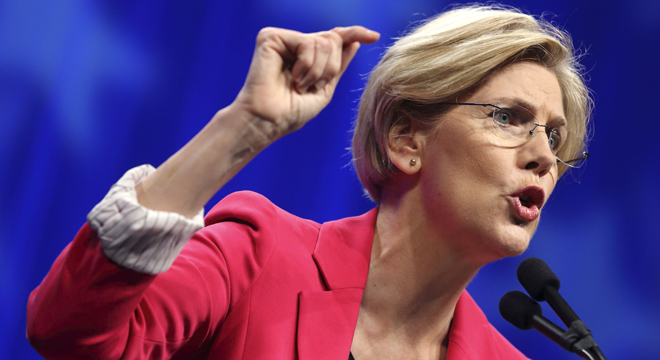Elizabeth Warren sees JPMorgan CEO Jamie Dimon’s Wednesday testimony before the Senate Banking Committee as an opportunity to push the government to strengthen financial reform, to increase pressure on Dimon to resign from the New York Fed Board — and to tie her Massachusetts Senate opponent Scott Brown to the Wall Street excesses that crippled the U.S. economy.
But the longtime reform advocate worries that powerful financial interests still control Congress and their own regulators, and that the window is closing for using JPMorgan’s eye-popping losses on bets with depositor funds to tighten regulations on Wall Street.
“[Dimon’s] continuing this, and Wall St. bankers generally say, ‘We’ll run our businesses the way we want and the American people won’t hear from us again until we lose billions of their dollars,'” Warren told TPM in an interview Wednesday morning ahead of Dimon’s testimony. “The JPMorgan scandal shows that the game is rigged.”
Before her Senate run in Massachusetts, Warren was a leading consumer advocate, progressive spokeswoman for regulating Wall Street, and the intellectual and institutional founder of the new Consumer Financial Protection Bureau. Her campaign was always going to hinge on the contrast between herself and Brown, whose vote for the Dodd-Frank financial reform bill was contingent upon weakening the Volcker Rule.
But JPMorgan’s risky trade, which violated the spirit of the Volcker Rule, allows her to vividly illustrate the differences between herself and her opponent.
“Wall St. banks get their way with Congress,” Warren said. “[N]ow the lobbying just moved out of the daylight to secret negotiations. … The big banks that broke the economy have not been held accountable. Scott Brown held the financial reforms hostage until they were weakened and then he worked after the laws were passed to weaken them further. That’s what people understand.”
I’ve reached out to the Brown campaign for comment, and will update with any response.
To illustrate the link between big financial firms and the real economy, Warren cited a recent Federal Reserve report on the enormous wealth middle class families lost as a result of the crisis.
“When companies like JPMorgan load up on risk, they jeopardize the economy for everyone,” she said. “Families have lost nearly 40 percent of their net worth. That’s nearly $50,000 that could’ve been used to help a kid through college, to fund their retirement or to allow people to sleep at night without worrying about how to pay for day care. … It directly affects the well being of millions of families around the country.”










